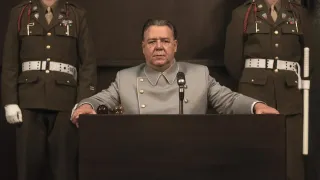
4 hours ago
Kristin Chenoweth Faces Backlash for Mourning Charlie Kirk
READ TIME: 3 MIN.
On September 10, 2025, conservative activist and Turning Point USA founder Charlie Kirk was fatally shot while speaking at Utah Valley University, an event that quickly made national headlines and drew statements from prominent public figures. One of the most unexpected responses came from Kristin Chenoweth, the celebrated Broadway actor and vocal supporter of queer rights, who posted a heartfelt message on Kirk’s final Instagram video.
Chenoweth commented, “I’m. So. Upset. Didn’t always agree but appreciated some perspectives. What a heartbreak. His young family. I know where he is now. Heaven. But still 💔.” Her words, quickly amplified across social media platforms, surprised fans who associate the “Wicked” and “Pushing Daisies” star with progressive causes and outspoken support for LGBTQ+ communities.
The reaction from both the general public and many in queer circles was swift and polarized. Social media users, particularly on platforms like Reddit and Instagram, voiced confusion and outrage at Chenoweth’s decision to publicly mourn Kirk—a figure widely known for his anti-queer statements and policy advocacy.
Some commenters questioned which of Kirk’s perspectives Chenoweth could have “appreciated,” pointing to his years of opposition to marriage equality, transgender rights, and reproductive freedom. “Girl WHAT. I wish some of these people would share exactly which perspectives of his they appreciated because I can't see any that a rational person with a standard amount of human empathy would support,” wrote one Instagram user, echoing a sentiment repeated on Reddit and Twitter.
Others, however, noted that Chenoweth’s main focus appeared to be on the tragedy of Kirk’s violent death and the impact on his surviving family, rather than on agreement with his ideology. In subsequent Instagram Stories, Chenoweth called the shooting “sad, senseless, and disgusting,” and reposted comments from both her husband and political commentator Brian Allen, labeling the attack “horrifying and unacceptable”.
Charlie Kirk, who became a household name through his leadership of Turning Point USA and frequent media appearances, was a lightning rod for controversy. He consistently opposed marriage equality, advocated for abortion bans without exceptions, and promoted legislation targeting transgender people’s rights. Kirk’s public statements included describing the passage of the Civil Rights Act as a “huge mistake” and supporting bans on teaching about LGBTQ+ identities in schools.
His final Instagram post, which became the focal point for Chenoweth’s tribute, depicted a heated exchange with a college student over abortion and premarital sex—topics that have long divided American public opinion.
Given Kirk’s well-documented history, many LGBTQ+ advocates voiced concern over public figures expressing admiration or even qualified appreciation for his views, citing the real-world harm caused by policies and rhetoric he championed. In the wake of his death, however, some leaders also emphasized the importance of rejecting violence and maintaining a commitment to civil discourse, regardless of ideological divides.
Kristin Chenoweth’s response highlights the complexities facing public allies of the LGBTQ+ community when navigating moments of national tragedy. As someone who has repeatedly advocated for queer rights—including public endorsements of marriage equality, transgender visibility, and opposition to anti-queer boycotts—Chenoweth’s remarks forced many fans and advocates to grapple with the boundaries between empathy for loss and endorsement of harmful ideologies.
Yet, the emotional response from many within queer communities underscores a persistent anxiety: That expressions of “appreciation” for even portions of an anti-queer figure’s legacy risk legitimizing views that have caused real harm. For activists and allies, the question remains: How can one maintain a commitment to empathy and nonviolence while holding the line against regressive ideologies?
As of publication, law enforcement continues to investigate the shooting, with the FBI and local authorities treating the case as a targeted political attack. President Donald Trump and other national leaders have commented on the case, and the suspect has reportedly been taken into custody.
Meanwhile, the debate over Chenoweth’s tribute continues to ripple through both entertainment and activist communities. For some, her remarks serve as a reminder of the need for nuance and compassion—even, or especially, when confronting painful divisions. For others, they are a cautionary tale about the risks of blurring the line between empathy for loss and tacit approval of harmful ideas.






